Fear Not Read online
Page 3
Things took a definite turn for the worse.
It couldn’t have been more than five minutes since he came ambling along Aker Brygge, alone, fed up and with no money for a taxi home. During those paltry 300 seconds he had swum in icy water, been certain he was going to die, saved a man from drowning, been praised by the police and almost frozen to death. In that same period of time, two fully equipped ambulances and three police cars containing a total of six uniformed officers had arrived at the scene. Which was almost incomprehensible, given the brief time span. In addition, as soon as he was pulled up on to the quay and the police had taken responsibility for the lifeless body he had held in a grip of iron, the security guard had called in no less than five of his colleagues from the nearby office buildings.
In the midst of this chaotic crowd of uniformed men and one lone woman, some thirty members of the public were milling about, all in various states of intoxication and all paying little attention to the temporary police cordon. Those who were still around in the early hours of this Sunday morning were drawn to the dramatic scene like moths to a flame. And since no more than five minutes had passed since Aker Brygge had been more or less deserted, the police had yet to grasp the connection between the security guard, the young swimmer, the drunk in the hat and the dead body that two of them had struggled to haul out of the water. The police had their procedures, of course, but it was dark, it was chaos, and the most important thing had been to get the drunk out of the water alive. For that reason, and perhaps also because one of their own had managed to fall in while they were heaving the body out, only two officers had taken a closer look at the corpse. One of them, a young man, was bent over and throwing up ten or fifteen metres beyond the cordon without anyone even noticing.
The other had covered the body and was quietly explaining the situation to a detective inspector when the young man with the stubble lost his balance due to sheer exhaustion.
He fell backwards. His blanket started to slip off. For a little while he was more preoccupied with not revealing his nakedness than regaining his balance, so he grabbed hold of the tarpaulin with both hands as he fell. It had got stuck on the far side of the trolley, which started to tip over. For a moment it looked as if the weight of the corpse would be enough to prevent total disaster, but the boy didn’t let go. He went down wearing nothing but the oversized trainers. The back of his head struck the icy ground with an audible thud. The pain made him cry out, then he lost consciousness for a couple of seconds.
When he came round, he noticed the smell first of all.
Something was lying on top of him, something that was suffocating him, taking his breath away with the stench of rotten flesh and sewers. Someone screamed and it occurred to him that he ought to open his eyes. The corpse was lying in perfect symmetry with his own body, as if in a kiss of death, and he found himself staring straight into the opening in the hood.
There was something in there that from a purely logical point of view had to be a head.
After all, it was inside the hood of a padded jacket.
In the police report which would be written some hours later it would emerge that for the time being the police were assuming that the body had been in the water for approximately one month. In the same report they would stress the fact that in all probability it was the clothes that were holding the body together, by and large. From a purely clinical point of view the corpse would be described as ‘badly swollen, partly disintegrating’, whereupon the writer of the report briefly pointed out that it was impossible to establish with any certainty whether it had been a man or a woman. However, the clothes might possibly indicate the former.
The boy, who had spent the whole of Saturday night trailing round Oslo in his quest for girls and booze, and who had thrown himself fearlessly into the fjord in the middle of winter to save another person’s life, passed out once more. This time he remained unconscious for a considerable period; he didn’t come round until he was lying in a bed in the hospital at Ullevål, his mother sitting beside him. He started to cry as soon as he saw her. The poor lad sobbed like a child, clinging tightly to her warm, safe embrace as he tried to suppress the memory of the last thing he had seen before the blessed darkness had borne him away from the sea monster.
From a hole in the formless mass, right where there had once been an eye, a fish had suddenly poked its head out. A tiny shimmering silver fish, no bigger than an anchovy, with black eyes and quivering fins; they had stared at one another, the boy and the fish, until it suddenly flicked its body and fell from the dead head, straight into the boy’s bellowing mouth.
On the Way to a Friend’s House
‘From now on we shall always have fish on Christmas Eve!’
Adam Stubo picked up the cod’s head from his plate with his fingers before sucking out the eye and chewing thoughtfully. His mother-in-law, who was sitting opposite him at the oval dining table, pursed her lips and turned her head away, raising her eyebrows. Her husband had already had a little too much to drink. He pointed at his son-in-law with both his knife and fork.
‘That’s my boy! Real men eat every bit of the fish.’
‘Actually,’ his wife began, ‘spare ribs on Christmas Eve has been a family tradition since—’
‘I’m sorry, Mum.’ Johanne put down her knife and fork. ‘It was a mistake, OK? A stupid and completely insignificant mistake. Can’t you just forget the spare ribs? The Middle East is in flames and we’re in the middle of a major financial crisis and you’re sitting here making a song and dance about the fact that Strøm-Larsen lost my sodding order. Everybody around this table likes cod, Mum, it’s not such a bloody—’
‘I hardly think it’s necessary to use language like that, dear. And I have to say that in my personal experience I have never known Strøm-Larsen to forget one single thing. I’ve been shopping with this city’s best butcher since before you were born, and I’ve—’
‘Mum! Can’t you just … ?’ Johanne closed her mouth, forced a smile and looked at her younger daughter Ragnhild. She was almost five, and was looking with curiosity at her father, who was eating the other eye.
‘Is that good, Daddy?’
‘Mmm … strange and interesting and delicious.’
‘What does it taste like?’
‘It tastes like a fish’s eye,’ said Kristiane, hitting her plate rhythmically with her fork. ‘Obviously. Fish’s eye, high in the sky.’
‘Don’t do that,’ her grandmother said gently. ‘Be a good girl for Granny and stop making that noise.’
‘Some people think fish is delicious,’ said Ragnhild. ‘And some fish think people are delicious. That’s only fair. Sharks, for example. Do sharks celebrate Christmas Eve, Daddy? Do they have little girls for dinner before they open their presents?’
She laughed uproariously.
‘It isn’t only sharks that eat people,’ said Kristiane.
As usual her little sister’s sense of humour had completely passed her by. Miraculously, she seemed untouched by the events of Saturday, apart from the odd sniffle and a blocked nose. It was more difficult to say how the whole thing might have affected her mentally. So far she hadn’t said a single word about any of it. The only minor change Johanne thought she perceived was that in the four days since her sister’s wedding Kristiane repeated texts learned by heart for longer periods than usual. Characteristically, Adam was looking at things from a positive point of view: the child was also in a phase where she asked more questions, reasoned more. She was curious, not merely repetitive.
‘Many species of fish have a varied diet,’ she said slowly, her gaze fixed on some distant point. ‘Under the right conditions they would feed extensively on human flesh, given the opportunity.’
‘I think we could talk about something a little more pleasant,’ said her grandmother. ‘Now, what are you really, really hoping to find among your presents after dinner?’
‘You know perfectly well, Granny. We gave you our lists ages ago. That dead
man they pulled out of the harbour at the weekend, that night when Mummy got so cross with me because I—’
‘Granny’s right,’ Johanne said quickly when Adam didn’t notice the pleading look she had given him. ‘It’s Christmas Eve and I think we could talk about something—’
‘He’d been in the water for a really, really long time,’ said Kristiane, swallowing before she piled more food on to her fork. ‘It was in the paper. That means you swell up. Like a great big balloon. This is because the human body is made of salt, and draws the water surrounding it. This is called osmosis. When two fluids with different osmotic pressures, or salt balance, are separated by a thin membrane, for example the cell walls in a human being, the water seeps through in order to even out …’
Her grandmother had turned noticeably paler. Her grandfather’s mouth was hanging open, and he closed it with an audible smack.
‘That kid,’ he grinned. ‘You’re quite a girl, Kristiane.’
‘Most impressive,’ said Adam calmly, wiping his mouth with a large white serviette. ‘But your grandmother and your mother are absolutely right. Death isn’t exactly a topic—’
‘Hang on, Adam,’ his father-in-law broke in. ‘Does that mean a human corpse swells up even more in fresh water than it does in the sea?’
‘What’s a corpse, Mummy?’
Ragnhild had picked up the cod’s head from her father’s plate. She slipped it over her nose, peering out through the empty eye sockets.
‘Booooo!’ she said, laughing. ‘What’s a corpse?’
‘A corpse is a dead person,’ said Kristiane. ‘And when dead people are in the sea for a long time they get eaten. By crabs and fish.’
‘And sharks,’ her little sister interjected. ‘Mostly sharks.’
‘Had the corpse been eaten?’ asked her grandfather with obvious interest. ‘It didn’t mention that in the paper. Is this one of your cases? Tell us all about it, Adam! As I understood from Aftenposten today, they still haven’t identified the body.’
‘No, it’s a case for the Oslo police, and all I know is what’s been in the paper. As you know I work for NCIS.’ He gave his father-in-law a strained smile. ‘We rarely help the Oslo police with anything other than technical matters. And circulating information on missing persons. International co-operation. That kind of thing. As I’ve told you several times in the past, in fact. Time for a change of subject, OK?’
Adam got up decisively and started clearing the table.
Silence fell. Only the sound of plates and cutlery being loaded into the dishwasher mingled with the muted voices of the Sølvguttene boys’ choir on television in the apartment below. The remains of the fish made Johanne feel slightly sick as she scraped the plates into the bin.
As usual she had gone to buy the spare ribs at the last minute. When she got to the butcher’s at ten o’clock that morning, they had already sold out. Nobody had any knowledge of the order she could swear she had phoned through two weeks earlier. The staff were full of apologies and expressed the greatest sympathy for the unfortunate situation that had arisen, but they had sold out of ribs. The owner couldn’t help coming out with a faint reproach: Christmas dinner should be purchased in good time, well before Christmas Eve itself. The thought of serving her mother cheap ribs from Rimi or Maxi on Christmas Eve had seemed even more alien than the idea of serving cod.
‘I should have bought that cheap pork from Rimi and sworn blind it came from Strøm-Larsen,’ she whispered to Adam as she put the last plate in the dishwasher. ‘She’s hardly eaten a thing!’
‘That’s her loss,’ he whispered back. ‘Calm down.’
‘Could we perhaps open a window?’ her mother suddenly said in a loud voice. ‘Of course, I’m not criticising the cod, it’s tasty and nutritious, but, after all, the smell of freshly cooked spare ribs is the smell of Christmas itself.’
‘Well, we’ll soon have the smell of coffee,’ Adam said cheerfully. ‘We’ll have coffee with the dessert, shall we?’
The choir had reached ‘Härlig är jorden’ in the apartment downstairs. Ragnhild joined in, and ran over to the TV to switch it on.
‘No TV, Ragnhild!’
Johanne tried to smile as she looked across from the open-plan kitchen.
‘We don’t watch TV on Christmas Eve, you know that. And definitely not while we’re eating.’
‘Personally, I think it’s an excellent idea,’ her mother protested. ‘After all, this meal is far too early in any case. It’s so lovely to watch Sølvguttene first. Those wonderful voices bring so much of Christmas. Boy sopranos are the most beautiful sound I can think of. Come along, Ragnhild, Granny will help you find the right channel.’
A red wine glass fell on the kitchen floor with a crash.
‘Nothing to worry about, everything’s fine!’ Adam shouted with a laugh.
Johanne dashed to the bathroom.
‘The soul weighs twenty-one grams,’ Kristiane announced.
‘Does it indeed?’
Her grandfather filled his schnapps glass to the brim for the fifth time.
‘Yes,’ Kristiane said seriously. ‘When you die, you become twenty-one grams lighter. You can’t see it. Can’t see can’t be can’t see can’t be.’
‘See it?’
‘The soul. You can’t see it leaving.’
‘Kristiane,’ Adam said from the kitchen. ‘I really mean it this time. Enough. We are not having any more talk about death and destruction. Besides which, that stuff about the weight of the soul is just nonsense. There’s no such thing as a soul in any case. It’s just a religious concept. Would you like some tea and honey with your pudding?’
‘Dam-di-rum-ram,’ Kristiane said in a monotone.
‘Oh no …’ Johanne was back from the bathroom. She crouched down beside her daughter. ‘Look at me, Kristiane. Look at me.’
She gently cupped the girl’s chin.
‘Adam asked if you wanted tea with honey. Would you like that?’
‘Dam-di-rum-ram.’
‘I don’t think it’s a very good idea to give the child tea when she’s in that … state. Come to Granny and we’ll listen to those clever boys. Come here, sweetheart.’
Adam was standing in the kitchen where his mother-in-law couldn’t see him. He waved to Johanne, silently forming words with his lips: ‘Take no notice. Pretend you can’t hear her.’
‘Dam-di-rum-ram,’ said Kristiane.
‘You can have whatever you want,’ Johanne whispered. ‘You can have the very thing you want most of all.’
She knew it didn’t help at all. Kristiane made her own decisions about where she was. During the course of fourteen years with this child so close to her that she sometimes found it difficult to tell which was her and which was her daughter, she still had no idea what made her go from one state to the other. They had learned simple patterns, Johanne and Adam and Isak, Kristiane’s father. Routines and habits; foods to be avoided and food that had a particular effect on her; drugs they had tried before agreeing they were unsuitable … specific paths had been cleared that made life with Kristiane simpler.
But for the most part her daughter was in a world of her own, following her own map and making her own incomprehensible choices.
‘Mummy loves you all the way to the stars and back,’ Johanne whispered quietly, her lips tickling her daughter’s ear and making Kristiane smile.
‘Daddy’s coming,’ she said.
‘Yes, Daddy will be here soon. When he’s had dinner with Grandma and Granddad he’s coming to see his little girl.’
Kristiane’s face was completely expressionless. It looked as if her eyes were moving independently of one another, and it frightened Johanne. Usually they were just fixed on something no one else could see.
‘The lady was—’
‘Her name is Albertine,’ Johanne interrupted. ‘Albertine was asleep.’
‘It was so cold. I couldn’t find you, Mummy.’
‘But I found you. In the end.’<
br />
Johanne was so focused on the child that she hadn’t noticed her mother. She caught the scent first, a present from her sister that cost more than Johanne spent on cosmetics and personal hygiene in an entire year.
Go away, she tried to convey with every fibre of her being. She arched her back and made a tiny movement to the side, still crouching beside her daughter.
‘Kristiane,’ the child’s grandmother said in her calm, firm voice. ‘Come to Granny, please. First of all we are going to open the red present with the pink ribbon on it. It’s for you. Inside is a box with a lid. When you open the box and lift the lid, you will find a microscope. Which is just what you wanted. Now take my hand …’
Johanne was still sitting with her hands resting on Kristiane’s narrow thighs.
‘Microscope,’ said Kristiane. ‘From the Greek micro, small, and skopein, to look at.’
‘Quite right,’ said her grandmother. ‘Come along.’
Sølvguttene were no longer singing. Ragnhild switched off the television, as did the neighbours down below. The aroma of coffee drifted from the kitchen, and the world outside was silent in the way it was only on this night of the year, when the churches had emptied, the bells had fallen silent and no one was on the way to or from anything or anyone any longer.
Her grandmother’s long, slender hand crept into Kristiane’s.
‘Granny,’ the girl said with a smile. ‘I want my microscope.’
But her eyes were fixed on Johanne. Her gaze was steady, and remained so until she went over to the sofa with her grandmother to open a Christmas present, the contents of which she already knew.
Johanne got stiffly to her feet and remained where she was.
An unaccustomed shiver of happiness ran through her body, only to disappear before she really had time to work out what it was.
*
For Eva Karin Lysgaard, happiness was a solid concept.
Happiness was her faith in Jesus Christ. Every day since she had met the Saviour while walking in the forest when she was sixteen she had experienced the joyous feeling of His presence. She spoke to Him often, and frequently received answers. Even in times of sorrow – and, of course, a woman of sixty had lived through such times – Jesus was with her, giving consolation and support and endless love.

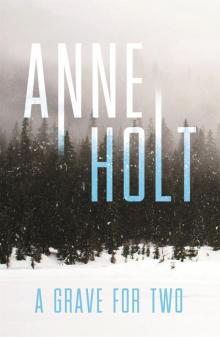 A Grave for Two
A Grave for Two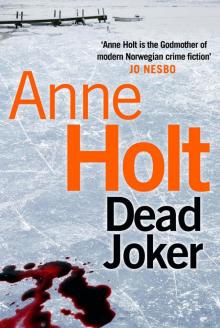 Dead Joker
Dead Joker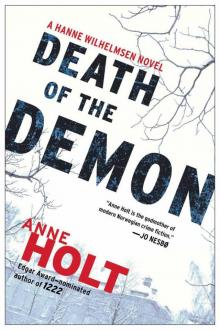 Death of the Demon: A Hanne Wilhelmsen Novel
Death of the Demon: A Hanne Wilhelmsen Novel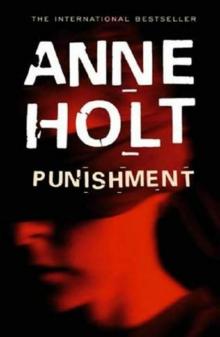 Punishment aka What Is Mine
Punishment aka What Is Mine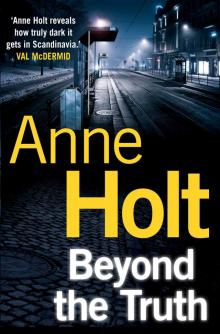 Beyond the Truth
Beyond the Truth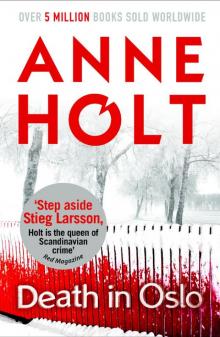 Death in Oslo
Death in Oslo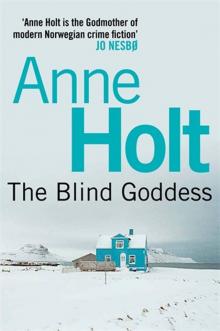 The Blind Goddess
The Blind Goddess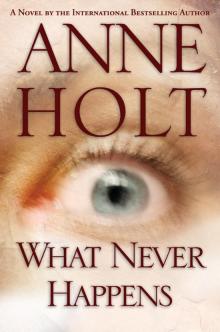 What Never Happens
What Never Happens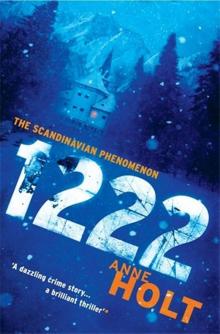 1222
1222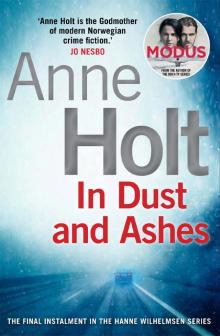 In Dust and Ashes
In Dust and Ashes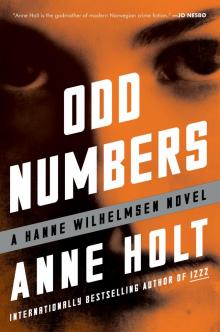 Odd Numbers
Odd Numbers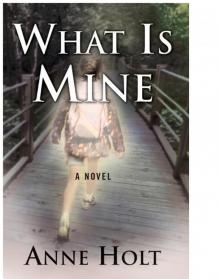 What is Mine
What is Mine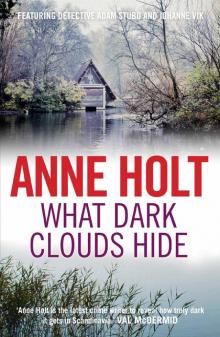 What Dark Clouds Hide
What Dark Clouds Hide Blessed Are Those Who Thirst
Blessed Are Those Who Thirst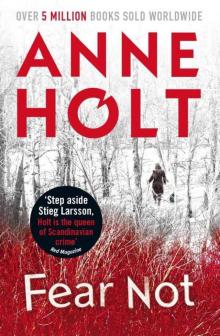 Fear Not
Fear Not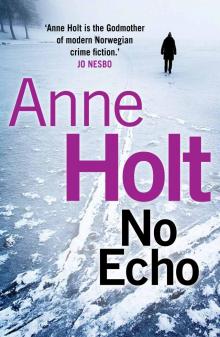 No Echo
No Echo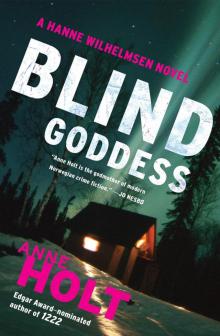 Hanne Wilhelmsen - 01 - The Blind Goddess
Hanne Wilhelmsen - 01 - The Blind Goddess